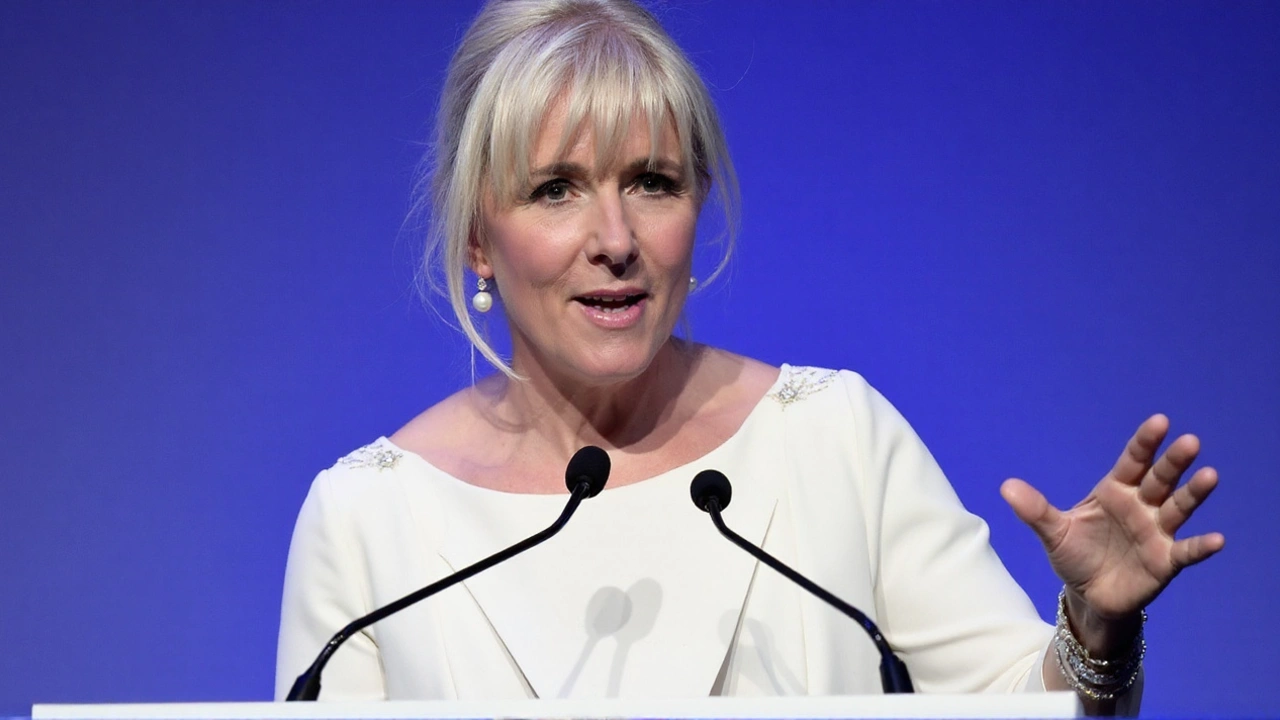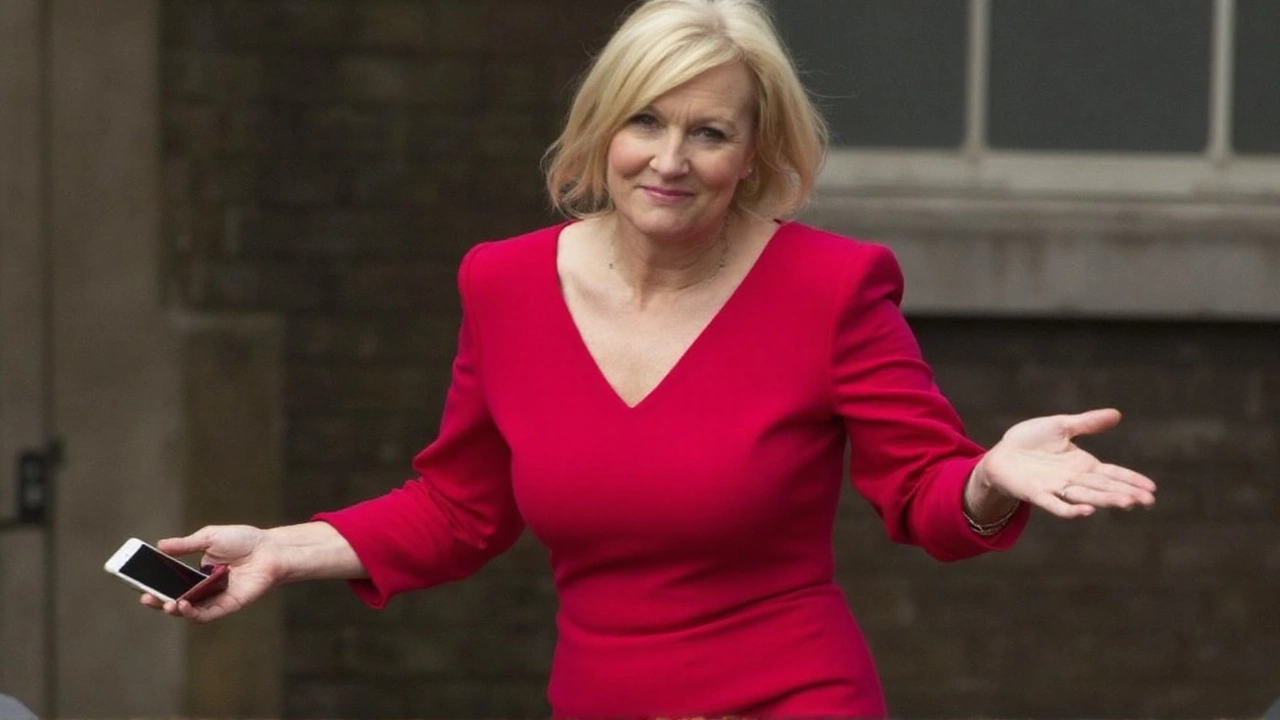The latest broadside against Conservative high command doesn’t come from an opposition bench or a whistleblower. It comes from a former cabinet minister with a platform and a grudge. In her new book, Downfall: The Self-Destruction of the Conservative Party, Nadine Dorries alleges a blend of internal sabotage, salacious secret lives, and even hints of foreign intelligence fingerprints. The timing is pointed: the party is licking its wounds after a major election defeat and is again searching for a leader.
What the book actually claims
Dorries frames Downfall as the sequel to The Plot, her first take on how Boris Johnson was brought down. This time she expands the canvas to 14 years and five prime ministers, from the Cameron era through Theresa May, Johnson, Liz Truss, and Rishi Sunak. The pitch is simple and incendiary: a small clique, operating in shadows, has steered the party and the country for years.
She drops the mock-spy codenames used in her first book—“Dr No,” “the Dark Lord,” “the Wolf”—and directly targets three familiar figures: Michael Gove, Dominic Cummings, and long-time party operator Dougie Smith. Dorries alleges their influence touched everything from leadership coups to media operations to the selection of candidates. As with her previous book, many scenes are reconstructed from unnamed sources Dorries says were “in the room.”
Several claims are already drawing heat, both for their seriousness and their sourcing. Among them:
- Allegations of group sex meetups organized over WhatsApp among Westminster staff and some politicians, based on accounts Dorries attributes to anonymous gay staffers.
- An assertion that Rishi Sunak’s early departure from last year’s D-Day commemorations had undisclosed political context. (Sunak publicly apologized at the time, saying he left to fulfill a TV interview commitment.)
- A claim that King Charles was effectively “stood up” at a Privy Council meeting, framed as part of a broader pattern of manipulation, with no documentary evidence offered in the text.
- Occasional nods to foreign intelligence intrigue—Mossad is name-checked—used to suggest the reach of political operators far beyond Westminster, again without substantiation.
The most sensational passages center on what Dorries presents as discreet sexual networks inside Conservative circles. She writes that staffers described WhatsApp groups coordinating encounters and says some elected politicians participated. Critics argue the material is voyeuristic and risks stigmatizing LGBT staffers; Dorries counters that she is exposing hypocrisy and a culture of impunity.
Her portrait of the alleged “clique” is not new—The Plot sketched it in shorthand. Downfall attempts to fill in dates, rooms, and motives. Gove is painted as the calculating strategist, Cummings as the disruptive enforcer, Smith as the behind-the-scenes fixer. The book offers little in the way of paper trails or on-the-record testimony to support the charge that they orchestrated a long-running operation. Dorries says legal checks were exhaustive and that sources demanded anonymity for fear of retaliation.
Two episodes are meant to show how this influence supposedly spills out into national moments. Sunak’s D-Day controversy, which dominated the news cycle when it happened, is recast as something more choreographed than a scheduling error. As for the Privy Council anecdote, palace diaries are rarely explained in public, and Buckingham Palace has not commented on the version presented in the book. Without documents or named witnesses, these scenes rest on the reader’s trust in Dorries’ informants.
Downfall also leans into the spy-thriller mood. At points, Dorries nods at foreign intelligence services—Mossad among them—while implying that British political operators flirt with, learn from, or benefit indirectly from such networks. There are no records or messages to back this up in the text, and the claims are framed more as implications than hard assertions.
How did she gather all this? The book repeatedly references “secret meetings” with insiders who spoke under strict conditions. Dorries recreates dialogue and room details, from whispered aside to drinks being stirred with honey. Reviewers who don’t buy her premise say those scenes read like one voice with multiple masks. Dorries says that’s the cost of coaxing scared sources to talk.
Context matters here. Dorries is not a neutral observer. She was Culture Secretary under Johnson, one of his most vocal loyalists, and later became a broadcaster and author after leaving Parliament in 2023. The Plot cast Johnson as the target of a dark internal operation. Downfall widens the allegation to the entire post-2010 Conservative project, arguing that the party’s collapse in 2024 was the inevitable result of years of scheming and moral decay.

The reaction and what’s at stake
The reviews split almost on tribal lines. Conservative-friendly commentators call the book a gutsy exposé, a necessary account of how machine politics hollowed out a once-formidable party. They point to the legal risks of UK libel law and argue a publisher would not have let it out the door without rigorous checks.
Mainstream critics are far harsher. The Telegraph gave it one star and said it reads less like a thriller and more like a rant overheard on public transport. Early Goodreads write-ups knock the heavy reliance on anonymous voices, saying too many conversations sound the same and too many dramatic claims lack corroboration. The charge sheet is long; the receipts, they say, are thin.
No newsroom has independently verified the most contentious claims in the book, including the alleged sex networks and the behind-the-scenes manipulation of national events. Several of the people named have not responded on the record in the pages of Downfall; they have, in the past, rejected suggestions that they orchestrated a standing conspiracy to control the party. Whether any of them will comment now—or take legal action—remains to be seen.
The broader question is how this lands inside a bruised Conservative Party. After a heavy election loss, factions are jostling for a story to explain what went wrong. Some blame broken promises on tax, immigration, and public services. Others point to the revolving door of leaders, the chaos of the Truss mini-budget, and drift under Sunak. Dorries offers a simpler answer: a malevolent handful manipulated events from the sidelines, ran smear campaigns through media allies, and fostered a corrosive internal culture.
Even readers skeptical of her conspiracy arc will recognize parts of the background: real scandals over standards, recurring misconduct cases across parties, and an ecosystem of WhatsApp chatter and late-night politicking that blurs professional and personal lines. Where she loses some critics is in the jump from culture critique to claims of organized networks controlling outcomes at will.
It also matters that Dorries writes like a participant, not an archivist. She brings color and certainty where a historian would hedge. That style is why her fans keep reading and why her detractors roll their eyes. The book’s most shareable lines demand that you either believe her sources or you don’t. There’s very little middle ground.
For the leadership race, the practical impact could be limited but noisy. Candidates are trying to convince members they can rebuild trust and win back lost voters. Dorries’ intervention reinforces a narrative that the party’s problems are less ideological than structural—that clearing out fixers and backroom tacticians matters as much as picking a tax policy. It’s red meat for Johnson loyalists who want a purge; it’s a headache for anyone trying to lower the temperature.
What happens next depends on whether any of the book’s claims prompt formal responses. If named figures speak out, if fresh evidence emerges, or if legal letters start flying, the story grows. If not, Downfall may settle into the same place The Plot did: a Rorschach test for how you see the last decade—either a brave account of what insiders whisper, or a sprawling theory stitched from unreliable narrators.
Three practical things to watch in the weeks ahead:
- Whether senior Conservatives publicly reject the “clique” narrative—or hint they’ve seen elements of it firsthand.
- Any legal or regulatory action in response to specific allegations, especially those naming identifiable individuals.
- How leadership contenders handle questions about culture at Westminster and whether they propose reforms beyond ethics codes and training.
Downfall will sell because it promises secrets at a moment when the party is vulnerable. It will also be argued over because so much turns on anonymous voices and reconstructed scenes. If you’re hunting for a documentary record, this isn’t it. If you want a guided tour through one faction’s theory of how the Conservative project blew up—from WhatsApp rooms to royal anterooms—it delivers exactly that, with all the drama and all the caveats baked in.

